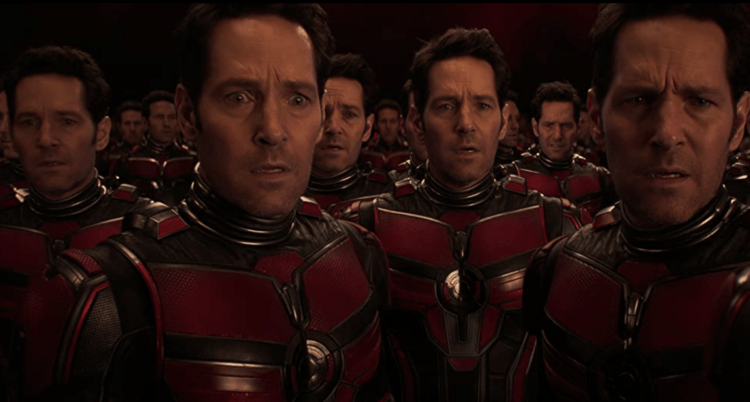The zaniest thing about “Ant-Man and the Wasp: Quantumania” is its name. Outside of that, it’s the same humdrum Marvel tedium we can expect with a stale cast of heroes, an endless stream of meaningless escalating stakes, and a surprisingly good performance from its villain, more due to its actor than its actual story. It’s the same thing we’ve gotten almost four times a year now since “Avengers: Endgame,” the last time it felt like the Marvel Cinematic Universe was building towards anything meaningful. Since then, it’s been tumbling down further and further, much like the characters of the movie plummeting into the quantum realm. And trust me when I say, the quantum realm is much less exciting than it sounds.
Despite each film being processed in the same machine, coming out of the same mold, they keep getting uglier. Even with its quantum imagination, so much of the green screen in this film is incredibly bland and unbelievable. There are some fantastic creature designs, riffing off the oft-ignored bizarre shapes of microscopic organisms. But any time two characters are standing in front of said creatures, or a quantum tree, or a quantum sky, we are made so keenly aware that we are looking at two people in front of a neon screen. To be fair, there is no chance that the audience can achieve complete immersion, especially when a giant floating head roams the sky with a glowing buzzsaw and dangling baby legs. But at the same time, that skepticism is baked into “Quantumania,” a movie that consistently asks us to question it.
The film at once wants us to accept it as a grand science fiction epic while at the same time it wants to be grounded in our very non-quantum reality, with characters responding to things as if their only reference points are movies from the 80s and not, you know, the several alien invasions onto their earth. The MCU has made billions of dollars out of deflating the incredible, making the spectacular something to be treated with derision and flippancy. Its characters are not amazed by this world — Why should we be? And if we’re meant to perceive this world as real, how do we explain the multiple gaping holes in the logic of its world? Pointing out plot holes Cinema-Sins-style does not good film criticism make. But when the movie begs you with each line of its dialogue to approach its world with skepticism, what other option do we have than to ask why there are suddenly people in the quantum realm, who are Kang’s faceless soldiers, what the heck are Kang’s powers, how big was Michael Douglas’ paycheck, and the biggest question of all: am I actually supposed to believe that Evangeline Lilly and Paul Rudd have romantic chemistry? Were they together in the prior movies? I really can’t remember! Because between every post-credit scene, cameo, and TV show, even I, an unfortunate Marvel fan, have completely forgotten what their quantum relationship is.
These are not movies anymore. We’re watching a prolonged web-series, being written with little to no planning other than where its characters need to be to launch the next spin-off. I just wish they could at least have the common decency to make that meandering movement from Point A to Point B in under 90 minutes.
Even as its blockbuster power starts to fade, the MCU remains committed to staying relevant. What that relevance often looks like is an extremely untactful way of approaching prescient social issues through the lens of their superpowered world. The worst offender is the status-quo-affirming racial commentary of “The Falcon and The Winter Soldier,” which somehow made the teenager who stood for immigration reform the villain. A close second is the devastation of Hiroshima being reduced to a turning point for an Eternal. “Quantumania” continues the trend by being the first MCU movie daring enough to use the word, “socialism,” and to attribute San Francisco’s homelessness crisis to the Blip, the mass evaporation of people caused by Thanos. On the one hand, it’s nice that the movie states the clearing of homeless encampments is unethical. On the other hand, is this really forward motion, if we’re more willing to attribute it to the fictional qualms of the MCU rather than real issues like gentrification or the lack of a social safety net? I’m undecided. And I’m far more likely to dwell on this question than I am on any other part of “Quantamania.”
One of the film’s very few quantum saving graces is Jonathan Majors as Kang, the MCU’s next big baddie. Majors is an actor that brings gravitas to any role he plays and is possibly the only living actor who can actually sell the lines he’s given in this movie. Every other line of his includes the word ‘time’ as if a dollar was put into a jar every time the word could be squeezed into the film. Still, he treats it with almost Shakespearean aplomb, committing to the role the same way Michael B. Jordan did with Killmonger or Cate Blanchett did with Hela, two of the MCU’s best villains. It’s just a shame that the film surrounding Majors seems to have no idea what to do with him. We are meant to fear Kang because he’s going to be the next Thanos. We are meant to see him as something frightening, something looming over the world, that will eventually threaten all of reality. But in this film, all we see is that he loves to milk a monologue and he has some hand beams. Those hand beams incinerate, yes, but why? Where do they stem from? What is he actually capable of? The only thing more infantile in film criticism than pointing out plot holes is debating power levels. But when the entire film and the rest of this franchise is predicated on the fact that Kang is unstoppable, it seems worth pointing out how boring limitless power is visually. “Quantumania” is more of an advertisement for Kang’s coming role in the MCU than it is a movie, and it can’t even do that well.
If you’re in the mood for a sprawling science fiction epic, maybe check out “Dune” to get a sense of what real world-building looks like. Or if you want a science fiction story with wacky costumes, that’s a little goofy but at least takes itself seriously? Try “Star Wars.” Or if you’ve really got a hankering to watch a story about rebellion, that actually deals with dissent rather than pilfers from its aesthetics, and you also need that story to be produced by Disney, check out “Andor.” But if for some reason, you’re like me, and you’re trapped on this ever-expanding quantum train on a circular rail and you can’t get off till the train hits its own caboose? Check out “Quantumania.”
Myle Yan Tay (MFAW 2023) cares a lot about movies and comic books. One day, maybe they will care about him. Find more of his writing at www.myleyantay.com.






















